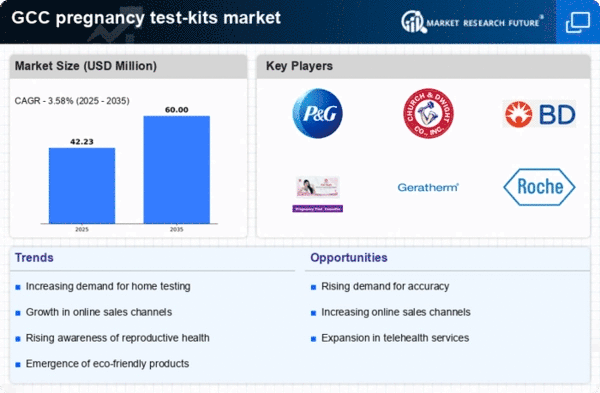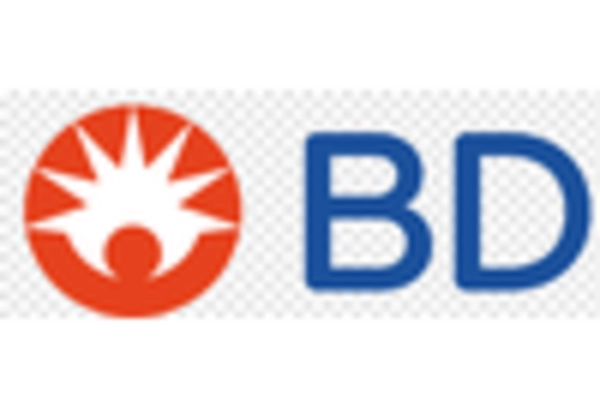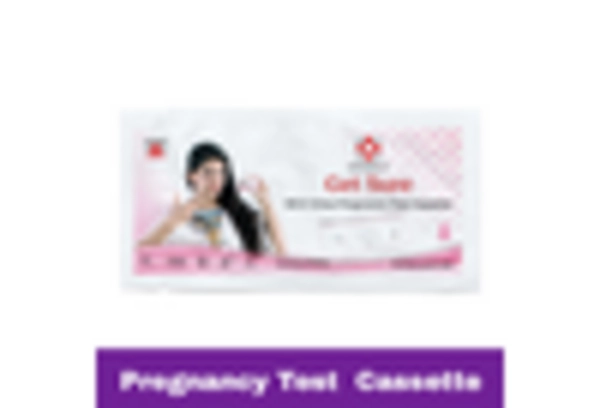Rising Birth Rates
The pregnancy test-kits market experiences a notable boost due to the rising birth rates in the GCC region. Recent statistics indicate that birth rates in countries like Saudi Arabia and the UAE have shown an upward trend, with figures reaching approximately 18 births per 1,000 people. This demographic shift is likely to increase the demand for pregnancy test kits, as more women seek early confirmation of pregnancy. The growing population, particularly among younger demographics, suggests a sustained interest in family planning and reproductive health. Consequently, manufacturers in the pregnancy test-kits market may find opportunities to expand their product lines and cater to a larger consumer base, thereby enhancing market growth prospects.
Increased Accessibility of Products
The accessibility of pregnancy test kits in the GCC region has improved significantly, contributing positively to the pregnancy test-kits market. Retail chains, pharmacies, and online platforms have expanded their offerings, making these products readily available to consumers. Reports indicate that the online sales channel for pregnancy test kits has grown by approximately 25% in the last year, reflecting changing consumer purchasing behaviors. This increased accessibility not only facilitates convenience for consumers but also encourages timely testing, which is crucial for early pregnancy detection. As a result, the pregnancy test-kits market is likely to see a rise in sales volume, driven by the ease of access to these essential health products.
Technological Innovations in Testing
Technological innovations in pregnancy testing are reshaping the landscape of the pregnancy test-kits market. Recent advancements have led to the development of more sensitive and accurate testing methods, allowing for earlier detection of pregnancy. For instance, some new kits can detect pregnancy as early as 6 days before a missed period, which is a notable improvement over traditional tests. This innovation not only enhances user experience but also increases consumer confidence in the reliability of these products. As technology continues to evolve, manufacturers in the pregnancy test-kits market may find opportunities to introduce new features, such as digital displays and smartphone connectivity, further driving market growth.
Cultural Shifts Towards Family Planning
Cultural shifts towards family planning in the GCC region are influencing the pregnancy test-kits market. As societal norms evolve, there is a growing acceptance of family planning methods and reproductive health discussions. This shift is reflected in the increasing number of women seeking pregnancy tests as part of their family planning strategies. Market data suggests that the demand for pregnancy test kits has risen by approximately 15% in the past year, indicating a proactive approach to reproductive health. Manufacturers may need to consider culturally sensitive marketing strategies to effectively reach this changing demographic, ensuring that their products resonate with the values and preferences of consumers in the pregnancy test-kits market.
Growing Awareness of Reproductive Health
The growing awareness of reproductive health issues among women in the GCC region is a significant driver for the pregnancy test-kits market. Educational campaigns and health initiatives have led to a better understanding of family planning and the importance of early pregnancy detection. Surveys indicate that approximately 70% of women in urban areas are now aware of the various types of pregnancy tests available. This heightened awareness is likely to translate into increased demand for pregnancy test kits, as women prioritize their reproductive health. Consequently, manufacturers may need to adapt their marketing strategies to align with this trend, ensuring that their products meet the evolving needs of informed consumers in the pregnancy test-kits market.

















